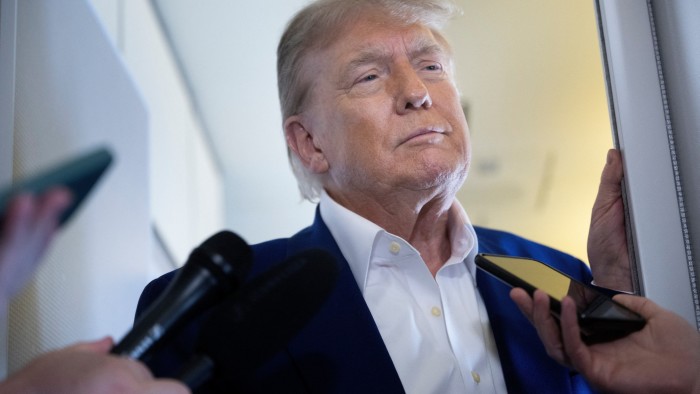NATO leaders are preparing for a potentially significant shift in the alliance’s mutual defense pact as concerns grow over Donald Trump’s intentions regarding U.S. security commitments that have safeguarded Europe for nearly 80 years.
Trump is scheduled to meet with his 31 NATO allies in The Hague on Wednesday. European leaders are hopeful that their pledges to increase national defense spending will reassure him of America’s continued protection in the event of an attack on their nations.
However, during a flight aboard Air Force One on Tuesday, the president raised alarms by suggesting that America’s commitment to Article 5 of NATO, which pertains to mutual defense, “depends on your definition.” He noted there are “numerous definitions” of Article 5, promising to provide a precise explanation at the summit.
These remarks have cast uncertainty over the gathering, according to three European officials, jeopardizing the objective of strengthening U.S. engagement in the transatlantic alliance. “The summit rests on what Trump decides,” one official remarked. “We are all just sat here waiting for him to tell us if he will defend Europe.”
Trump’s statements come in the wake of previous assertions indicating he would only support allies that invest more in their defense, alarming European leaders who worry about the potential threat of a Russian attack on NATO members within the next decade.
Torrey Taussig, a former director of European affairs at the White House National Security Council, expressed concern, stating it was “the last thing that NATO Secretary-General Rutte or NATO allies wanted to hear,” especially as the summit aimed to secure U.S. commitment to NATO without controversy.
Mark Rutte has made efforts to create a welcoming atmosphere for Trump, trimming the summit’s schedule to two and a half hours and privately commending him for pressuring European nations to enhance military spending. “Europe is going to pay in a BIG way, as they should, and it will be your win,” Rutte communicated in a message shared by Trump on social media.
However, Spain’s refusal to commit to spending 5% of its GDP on defense by 2035 has created dissent among member states, prompting calls for greater flexibility. “Spain’s not agreeing, which is very unfair to the rest of them,” Trump commented while onboard the plane.
He further argued that the U.S. should not contribute the same level of funding as “everyone else,” claiming that European defense expenditures should aid in bolstering infrastructure, pointing out, “we don’t have any roads in Europe, we don’t have any bridges in Europe.”
Rutte reassured reporters of the U.S. commitment to NATO and Article 5. Nevertheless, Rachel Rizzo, a non-resident senior fellow at the Atlantic Council’s Europe Center, expressed skepticism over whether Trump had ever clearly articulated a commitment to NATO’s mutual defense agreement. She acknowledged that the rest of the alliance might be “maybe looking for something they’re just never going to get.”
As the largest defense spender in NATO, the U.S. is a pivotal member of the alliance, with numerous European nations dependent on its advanced military resources, including long-range missiles, intelligence, and surveillance capabilities.
While previous U.S. presidents advocated for increased European defense spending, Trump’s approach has been notably more assertive, directly linking U.S. security assistance to ally commitments. He has also called for a balance in defense expenditure between the U.S. and European allies, enabling American military resources to focus more on challenges in Asia and the Middle East.
“With the Trump administration, everything is a negotiation and everything is on the table,” commented Sophia Gaston, a research fellow at King’s College, London. “Anybody who believes anything different is frankly naive.”

